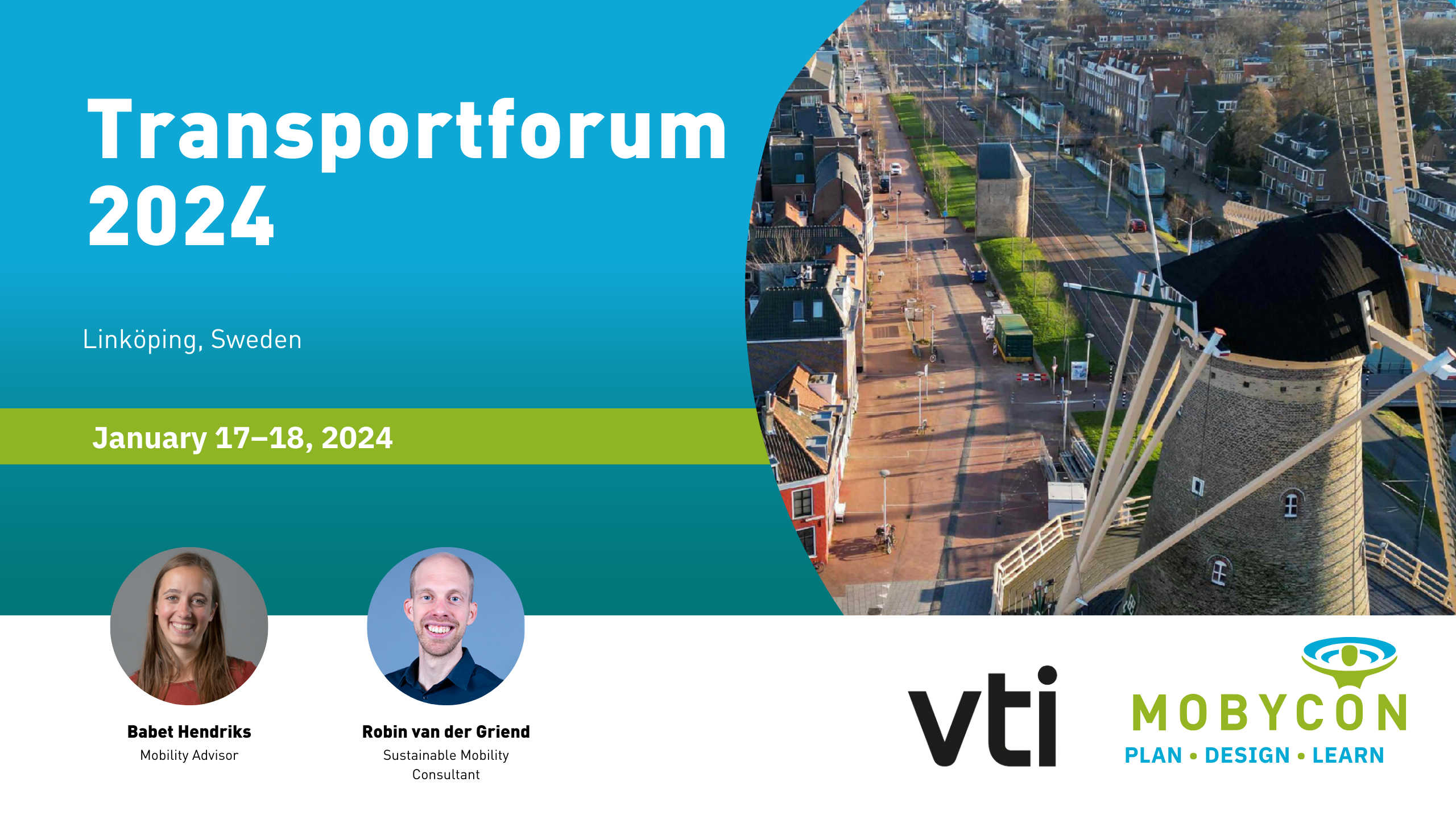Conference
Mobycon at Transportforum 2024
Robin van der Griend and Babet Hendriks are presenting Mobycon’s work on the Good Street and Mobility Donut at Transportforum 2024 in Linköping, Sweden! Both topics are core to Mobycon’s mission of making the world less dependent on cars. We introduced the Good Street Approach as a method focusing on Sustainable Safety and Network Planning principles to ensure a harmonious blend of movement and place in urban areas, and the Mobility Donut as a guide to steering away from prioritizing excessive travel, aiming for equitable and sustainable mobility systems that meet everyone’s needs without compromising our planet’s limits.
If you’re planning on attending, be sure to come say hi! And if these topics sound interesting to you, learn more about the conference and register here.


The Good Street – Balancing Place and Flow with a Kinetic Approach
Authors: Lennart Nout, Robin van der Griend
Virtual poster displayed throughout conference
Cities are getting busier. The mobility of an increasing number of city dwellers per square kilometre cannot be maintained with the traditional modal split, requiring a reduction in the proportion of space dedicated to in favour of more space-efficient modes of transport (e.g. bikes, e-bikes, cargo-bikes, escooters). This growing pressure results in more and more tension between space for movement and place. Within the traffic planning world, the focus is often primarily on facilitating efficient movement, while the spatial quality of a place is given less attention. On the one hand, the many vehicles parked on the sidewalk are competing for space, leaving the public realm increasingly cluttered. On the other hand, a healthy mix of functions and some ‘friction’ is also what gives a city its character.
At the same time, there is an ever-increasing diversity of (new) vehicles, such as e-scooters, but there remains a lack of clarity on their place on the road or bicycle infrastructure. The size and speed of these vehicles greatly differs. This has led to new mobility challenges resulting in a growing number of traffic injuries and fatalities, including many cyclists.
Mobycon has developed a method to bring balance between Place and Flow within urban areas. We call this The Good Street Approach. This Method builds on the existing Sustainable Safety and Network Planning principles. Instead of reacting to present traffic volumes, it takes a more active approach by acknowledging that decisions taken on a network level are reflected on a street level. In addition, the method takes kenetic energy into account. The more kinetic energy vehicles have, based on their speed and achievable speed, the more severe the consequences of a collision would be. Vehicles can be organised into ‘families’ based on their potential kinetic energy.
By organising vehicles into ‘families’ based on their potential kinetic energy, we can easily categorise any vehicle and related networks, now and in the future.
This way, the Good Street Approach can identify when modes can be safely mixed and when segregation is needed, as well as when changes on a network level are needed to achieve the desired balance between Place and Flow.

Enhancing equitable mobility policy: using the Mobility Doughnut
Authors: Babet Hendriks, Lennart Nout, Robin van der Griend
Presentation: Thursday, 18 January 2024, 10:00 – 11:00
For whom and why do we work on our mobility system? Many mobility or urban planners seem to think – often unconsciously –that tomorrow’s world should enable faster travelling and bridge larger distances. This is also how contemporary policy often functions: design for a better flow through on arterial roads and dissolve bottle necks. This approach has reached, as we all know and experience, its boundaries. Therefore, we have introduced a new perspective to the mobility system: the Mobility Doughnut.
Mobycon’s Mobility Doughnut is inspired by economist Kate Raworth’s book the Doughnut Economy. Raworth describes how the mainstream economic theories result in extreme poverty, while the rich become richer. We see a parallel in mobility where policies and designs favor those who already travel excessively, enabling those groups to travel even faster or more comfortably. By introducing the Mobility Doughnut, we want to progress the dialogue about social and sustainable mobility systems for all. The Mobility Doughnut measures the impact of mobility on society and the environment, helping meet the needs of everyone, without reaching the limits of our planet.
At Mobycon we have developed a Mobility Doughnut methodology to engage with local stakeholders. The method supports local stakeholders to envision the future of their living environment. The Mobility Doughnut framework is at the heart of every session going from problem analysis (the current Mobility Doughnut balance) to what kind of living environment do we aspire to live in (the intended Mobility Doughnut balance). This helps to come up with a set of measures that favor an equitable environment, prioritizing measures for active mobility measures and reallocation of space.
We would like to encourage other mobility professionals to use and apply the Mobility Doughnut frame by showing how it works (preferably in a workshop setting).
Transportforum 2024 will be hosted on Wednseady & Thursday, 17 – 18 January 2024, in Linköping, Sweden. For more information about the conference, see their website: https://www.vti.se/transportforum

